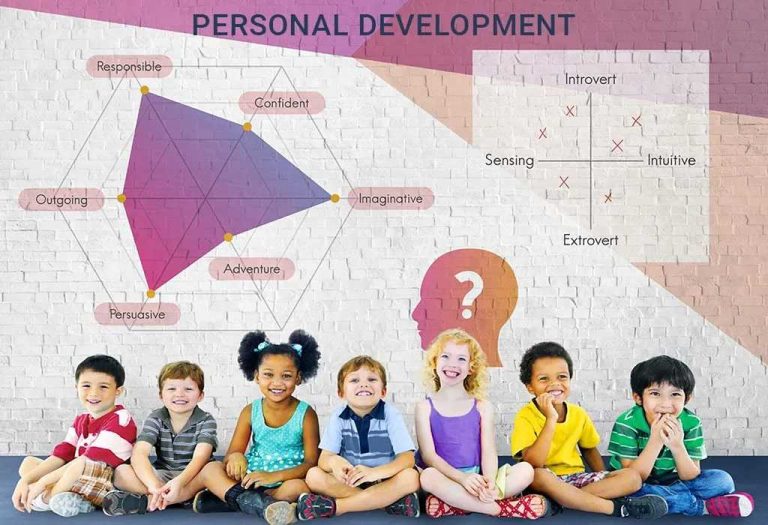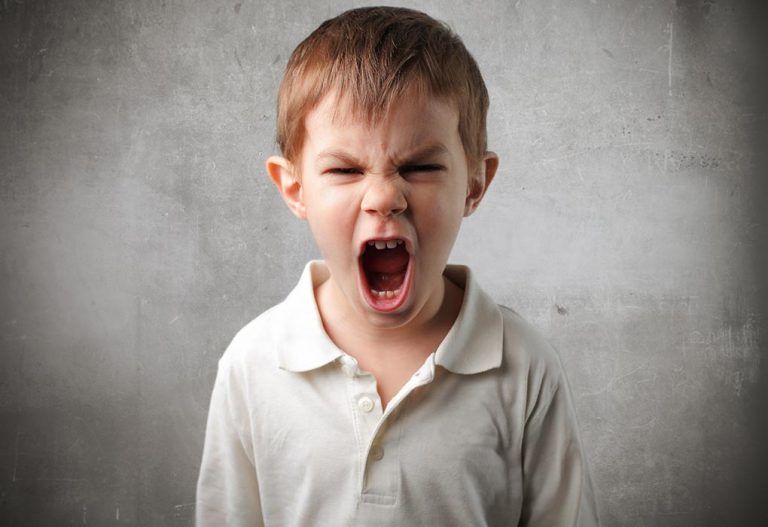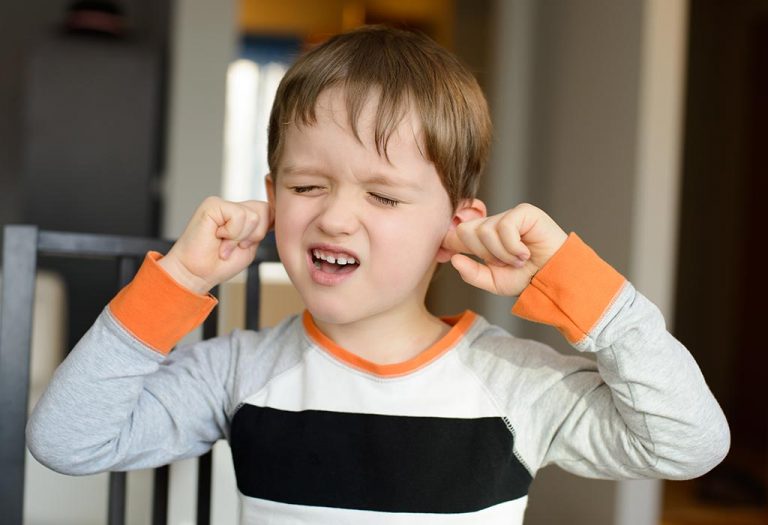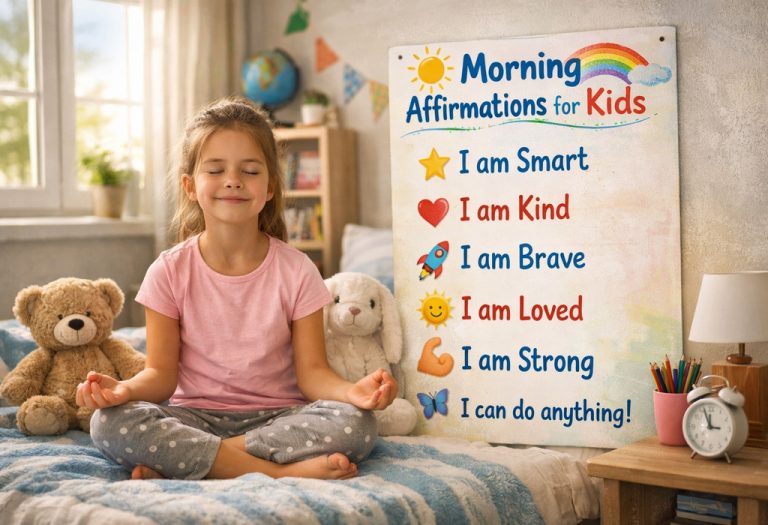10 Tips On Personality Development For Kids

Personality development for kids is an ongoing journey that requires continuous support and guidance from parents, teachers, and caregivers. It encompasses a wide range of factors, including social, emotional, and cognitive development. From fostering a growth mindset and teaching problem-solving skills to promoting empathy and emotional regulation, there are countless ways to nurture a child’s positive personality traits from a young age. Engaging in activities that encourage self-expression, such as art, music, and storytelling, can also play a significant role in shaping a child’s identity and confidence. Moreover, providing opportunities for positive social interactions and collaboration helps children develop essential interpersonal skills and a sense of belonging.
What Exactly Is Personality Development in Kids?
There are many facets to a child’s personality, beginning with their own confidence, courage, and self-esteem to how they treat and respect others. Between the age of three and six, you can see the personality of your child developing. This is the right time to inculcate in them some values and practices that grooms them into positive individuals. As children learn and model the behaviour of their parents, you become the single biggest influencing factor in your child’s personality development.
Benefits of Personality Development for Kids
By nurturing positive traits and skills from a young age, children can enhance their social-emotional, and cognitive abilities, laying a strong foundation for their future. Following are some of the many benefits of personality development for kids:
1. Improved Self-Confidence
Through activities that encourage self-expression and positive reinforcement, children develop a sense of confidence in their abilities and worth.
2. Enhanced Communication Skills
Engaging in various forms of communication, such as verbal expression, active listening, and non-verbal cues, helps children convey their thoughts and feelings effectively.
3. Better Conflict Resolution
Learning to navigate conflicts constructively teaches children valuable skills in negotiation, compromise, and empathy, fostering healthier relationships.
4. Increased Resilience
Experiencing challenges and setbacks within a supportive environment enables children to build resilience and adaptability, equipping them to cope with adversity in the future.
5. Strengthened Leadership Abilities
Opportunities to collaborate, delegate, and take initiative enable children to develop leadership qualities, such as decision-making and teamwork skills, essential for success in various aspects of life.
6. Cultivation of Empathy and Compassion
Engaging in activities that promote empathy, such as volunteering and perspective-taking exercises, fosters a sense of compassion and understanding towards others, nurturing positive social relationships.
Ways to Develop Your Child’s Personality
So, how to develop a child’s personality? Many parents think lecturing their children about the dos-and-don’ts is the best way to influence their personality. Children do not pick up values from endless lectures, but from mirroring your behaviour. Therefore, the best way to give them a confident upbringing is to subtly push the agenda of positive personality traits in day-to-day actions. Here are some ways you can do it.
1. Stay Away From Labelling
Words make the world. When, as parents, you decide to brand your child for certain behaviour, you unconsciously make the child believe that he or she is indeed like that. Labelling the child closes their options of correcting themselves also. This may lead to low self-esteem, and the child might end up imitating this behaviour with others around him. Remember to always be cautious with your words, especially while correcting your child’s mistakes.
2. Be a Good Listener
Children crave for attention all the time. As kids grow, they become more and more independent. Preschoolers and toddlers tend to express themselves more by talking, especially when their language skills are developing. As parents, you can listen to their stories patiently to make them feel confident and secure in your company. This sets precedence for them to be good listeners themselves and also develops their confidence.
3. Be Gentle on Their Shortfalls
Many parents expect their children to excel at everything they do. When children do not match up to their expectation, they express their disappointment on the child in many ways by accusing them of not being competent enough. Each child has a unique capability, and as parents, you must identify and encourage it. You can give gentle assistance to improve the child’s shortcomings without lowering their confidence in themselves.
4. Refrain From Comparison
Comparing your child with other friends, relatives, and neighbours can do a great deal of damage to your child’s personality. Constantly comparing the child to someone makes the child believe he is not good enough. Children get confused about their own identity and start mimicking others. Respecting the child’s individuality is undoubtedly the first and foremost step in building their confidence and bringing the best out of them.
5. Model the Right Behaviour
Children learn what they see, more than what they hear. Therefore, practically implementing things that you advocate will leave a lasting impression on them. Starting from little things like arranging the books back on the shelf to being polite to guests, children follow what you do. If there is any hypocrisy or disagreement in your behaviour, children pick it up very quickly. Therefore, it is very important to practice what you preach.
6. Allow Unstructured/Free Playtime
Free play has drastically reduced among the children of this generation due to so many reasons. Nothing can teach values like sharing, caring, team spirit and resilience like playing a sport. Sports and games are the best personality development activities for kids. Sadly, many parents today shield their children from field play and even restrict them from taking up any sport. For an overall physical and mental development of your child, you must involve him actively in a sport. It is also great for children to unwind every day from the stress of academics and remain cheerful.
7. Limit Screen Time
Gadgets are new-age problems many parents struggle with. Studies have shown that too much screen time impacts children’s intellectual and social development. Playing games on gadgets leads to addiction, and in turn, leaves less time for social interaction. Spend more time with your child playing games and travelling to divert him from gadgets and give a real-life experience of things around him. Teach your child to value the roundings and people more than the virtual things he sees.
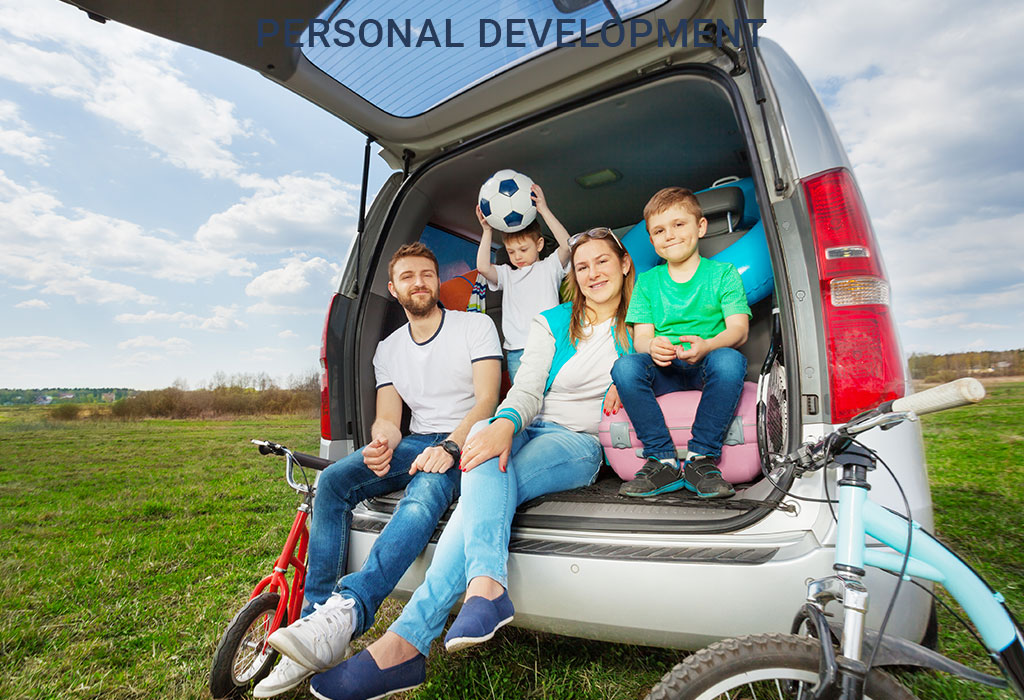
8. Chalk Out the Rules
Giving clarity to children about their responsibilities is essential for better understanding. Sometimes, parents fail to communicate what they expect from the child and end up accusing them of their misbehaviour. When the rules are straight, the child learns to align his behaviour with the expectations. It may take time for children to tune themselves to the set of rules, but continuous adherence to a code of conduct makes it a habit, eventually.
9. Encourage Independence
Parents of toddlers usually assist the child with all their work to the extent that they stop encouraging the development of any individuality or independence. While it is important to be caring and nurturing, it also important to teach kids to slowly manage their simple responsibilities. For things like packing the schoolbag, brushing teeth, or doing homework, you can encourage your child to become independent and provide minimal supervision. This not only trains children in essential life skills but also improves their sense of responsibility.
10. Practise Gentle Parenting
Physically reprimanding your child or yelling at him for his mistakes is going to make things worse for you and the child. Many times, children take the yelling to heart and do not register the corrective action they are expected to take. Patiently explaining the consequences of their wrongdoings will be an effective way of bringing the desired change in their mind. When you yell at your child, he obliges out of fear and does not understand the consequences of his action. Explaining, or even sometimes letting him experience the results of his actions, helps him understand the cause-effect relationship.
Personality Development Activities for Children
Personality development activities for children play a crucial role in shaping their character, fostering essential skills, and promoting overall well-being. By engaging in these activities, children can develop self-awareness, empathy, resilience, and other positive traits that contribute to their personal growth. Following are some personality development activities for kids:
1. Creative Expression Through Arts and Crafts
Encourage children to explore their creativity by engaging in various art and craft activities, such as drawing, painting, sculpting, and collage making.
2. Role-Playing and Pretend Play
Provide opportunities for children to engage in role-playing games, where they can take on different roles and perspectives, fostering imagination, empathy, and social skills.
3. Storytelling and Creative Writing
Encourage children to express themselves through storytelling, either by creating their own stories or retelling existing ones, which helps develop language skills, creativity, and communication abilities.
4. Mindfulness and Relaxation Techniques
Introduce mindfulness exercises, such as deep breathing, guided imagery, and progressive muscle relaxation, to help children manage stress, enhance self-awareness, and improve emotional regulation.
5. Team Building and Collaboration Activities
Organize group activities, such as team sports, cooperative games, or group projects, to promote teamwork, communication, leadership, and problem-solving skills.
6. Community Service and Volunteering
Engage children in community service projects or volunteering opportunities, where they can contribute to helping others, fostering empathy, compassion, and a sense of social responsibility.
7. Emotional Intelligence Activities
Implement activities that encourage children to recognize and express their emotions, understand the feelings of others, and develop empathy, such as emotion recognition games or journaling about their emotions.
8. Goal Setting and Personal Development Plans
Guide children in setting realistic goals for themselves and creating action plans to achieve them, teaching them the importance of perseverance, self-discipline, and self-improvement.
Myths About Personality Development in Kids
The word ‘Personality’ is often misinterpreted. It is a myth that a child’s personality is limited to appearance. Parents emphasise on clothes, grooming and health, oblivious to the fact that these form just one aspect of the personality. The child’s outlook on life, knowledge, social skills, interpersonal skills, etc. contribute towards the building of a balanced personality.
FAQs
1. What role does positive reinforcement play in personality development?
Positive reinforcement involves acknowledging and rewarding desirable behaviors in children. By praising and acknowledging their efforts and accomplishments, parents can reinforce positive behaviors, boosting their child’s self-esteem and motivation.
2. How can I help my child develop empathy and compassion?
Parents can promote empathy and compassion in their children by leading by example, demonstrating empathy in their interactions with others, and encouraging perspective-taking. Engaging in activities that promote kindness and volunteering can also foster these traits in children.
3. What strategies can I use to teach my child resilience?
Parents can help their children develop resilience by fostering a growth mindset, emphasizing the importance of effort and perseverance over innate ability. Encouraging problem-solving skills, discussing challenges openly, and providing emotional support during difficult times are effective strategies for building resilience in children.
So these were some personality development tips for children. Do remember that child personality development is a long drawn process in which may experience some temporary setbacks. A consistent effort towards inculcating positive values, behaviour, and attitudes is sure to pay off in the long run as you bask in the satisfaction of nurturing a well-rounded individual.
References/Resources:
1. Anaya. B, Pérez-Edgar. K; Personality development in the context of individual traits and parenting dynamics (New Ideas in Psychology); National Library of Medicine; https://www.ncbi.nlm.nih.gov/pmc/articles/PMC6411068/; March 2018
2. Utesch. K, Zalk. M, Back. M; Understanding Personality Development: An Integrative State Process Model (International Journal of Behavioral Development); ResearchGate; https://www.researchgate.net/publication/308779493_Understanding_Personality_Development_An_Integrative_State_Process_Model; December 2016
3. Vries. J, Spengler. M, Frintrup. A, Mussel. P; Personality Development in Emerging Adulthood—How the Perception of Life Events and Mindset Affect Personality Trait Change; Frontiers; https://www.frontiersin.org/journals/psychology/articles/10.3389/fpsyg.2021.671421/full; June 2021
4. Slobodskaya. H; Personality development from early childhood through adolescence (Personality and Individual Differences); Science Direct; https://www.sciencedirect.com/science/article/abs/pii/S019188692030787X; April 2021
5. Thompson. R; Social and Personality Development in Childhood; California State University; https://cool4ed.calstate.edu/bitstream/handle/10211.3/180951/
6. Smidt. W, Embacher. E; Does personality matter? The relationship between child personality and interaction quality in preschools; Taylor & Francis Online; https://www.tandfonline.com/doi/full/10.1080/02671522.2021.1941217; July 2021
7. Däschle. J, Hofmann. C, Wernicke. J, et. al.; The relationship between parenting behavior and the personality of kindergarten children; Frontiers in Psychology; https://www.frontiersin.org/journals/psychology/articles/10.3389/fpsyg.2023.1048391/full; February 2023
Also Read:
Role of Parents in Child Development
Cognitive Development in Children
Physical Development in Early Childhood
Importance of Play in Your Child’s Development
Was This Article Helpful?
Parenting is a huge responsibility, for you as a caregiver, but also for us as a parenting content platform. We understand that and take our responsibility of creating credible content seriously. FirstCry Parenting articles are written and published only after extensive research using factually sound references to deliver quality content that is accurate, validated by experts, and completely reliable. To understand how we go about creating content that is credible, read our editorial policy here.






